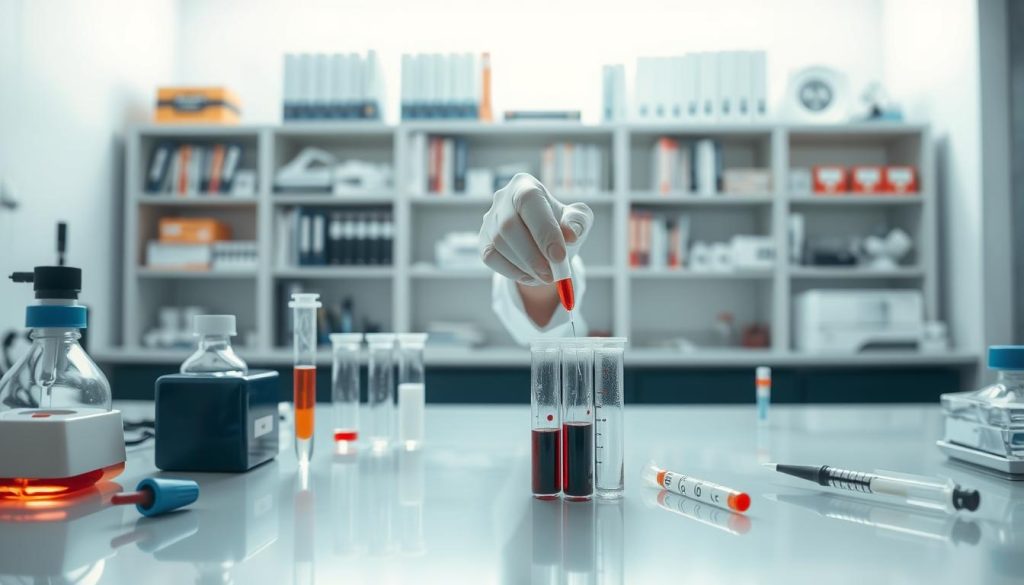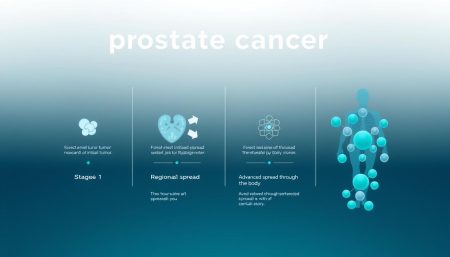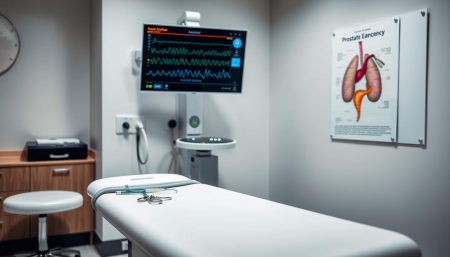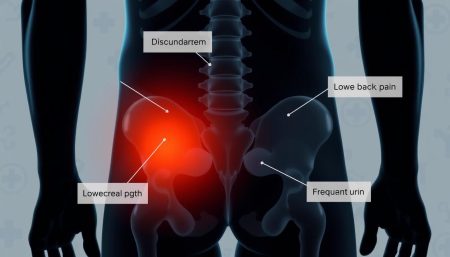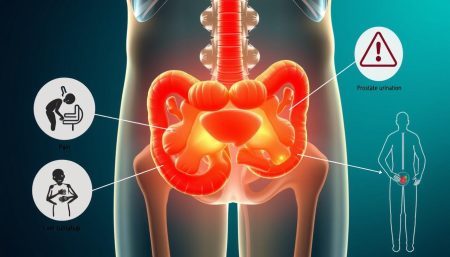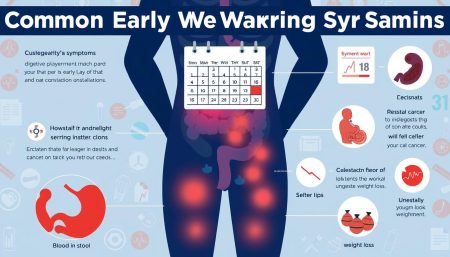In the world of healthcare, early detection blood tests are key to proactive health management. They play a crucial role in finding cancer early. This is a big step towards better health outcomes.
Thanks to new technology, the cancer screening blood test is now a major tool against cancer. It lets doctors see what’s happening inside the body with just a blood sample. Knowing how these tests work is important for catching cancer early.
Key Takeaways
- Early detection blood tests are revolutionizing cancer care with their non-invasive nature.
- Proactive health management has become more attainable thanks to advancements in blood test technology.
- Cancer screening blood tests enrich the early diagnosis process, potentially increasing survival rates.
- The variety and specificity of blood tests contribute significantly to personalized cancer treatment plans.
- Understanding the nuances behind the accuracy and reliability of these tests is crucial for healthcare providers and patients alike.
Understanding Blood Tests for Cancer Screening
Blood tests are key in finding cancer early. They are a non-invasive way to spot disease signs. The cancer blood test accuracy and ability to find different blood test for cancer types make them vital in today’s medicine.
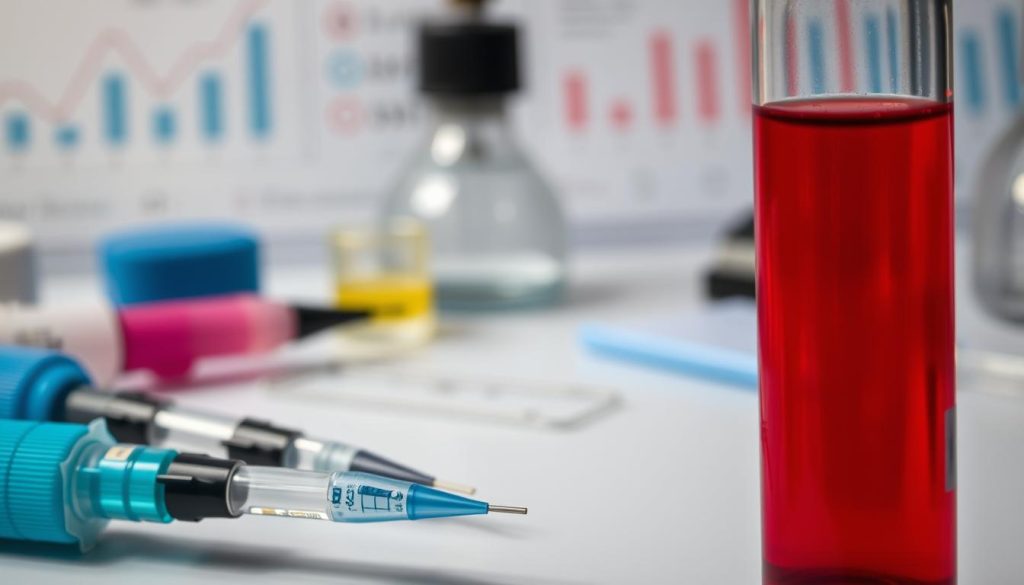
What Are Cancer Screening Blood Tests?
Cancer screening blood tests look for cancer cells, DNA, or biomarkers in the blood. They give important clues for early treatment. These tests are getting better to be more reliable.
Types of Cancer Detected Through Blood Tests
Many cancers can be found through blood tests, like leukemia, lymphoma, and some breast and prostate cancers. Each cancer has its own markers in the blood. This helps doctors create the best treatment plans for each patient.
Here’s a table showing some cancers and the tests used to find them:
| Cancer Type | Blood Test Used | Marker Detected |
|---|---|---|
| Leukemia | Complete Blood Count (CBC) | Abnormal white cell counts |
| Lymphoma | Lactate Dehydrogenase (LDH) Test | Elevated LDH levels |
| Breast Cancer | CA 15-3/CA 27.29 Marker Test | Cancer antigens 15-3 and 27.29 |
| Prostate Cancer | Prostate-Specific Antigen (PSA) Test | Elevated PSA levels |
Knowing about lab test results is very important. It helps when talking to your doctor about health issues, especially with cancer screenings.
Improvements in blood test for cancer types help find cancer early. This is crucial in fighting cancer. So, making sure cancer blood test accuracy stays high is a big focus in cancer research and medicine.
The Role of Tumor Markers in Cancer Detection
Tumor markers are key in finding and managing cancer early. They are substances made by cancer cells or by the body’s response to cancer. These markers help doctors diagnose and track cancer’s growth or how well it’s responding to treatment.
Defining Tumor Markers
Tumor markers are molecules found in blood or tissue that show cancer. They can be made by the tumor or by the body’s reaction to it. A tumor marker blood test is used to diagnose cancer, plan treatments, and check if treatments are working or if cancer has come back.
Common Tumor Markers and Their Significance
There are many tumor markers for different cancers. For example, Prostate-Specific Antigen (PSA) is used to screen for prostate cancer in men. Cancer Antigen 125 (CA-125) is monitored in ovarian cancer cases. Alpha-Fetoprotein (AFP) is important for diagnosing and tracking liver cancer.
- PSA (Prostate-Specific Antigen) – A valuable marker for screening and monitoring prostate cancer.
- CA-125 (Cancer Antigen 125) – Used for detecting and monitoring ovarian cancer.
- AFP (Alpha-Fetoprotein) – Key in diagnosing and monitoring liver cancer.
Knowing which tumor markers are linked to certain cancers helps doctors use blood tests for cancer biomarkers better. This leads to more tailored treatments and better results for patients.
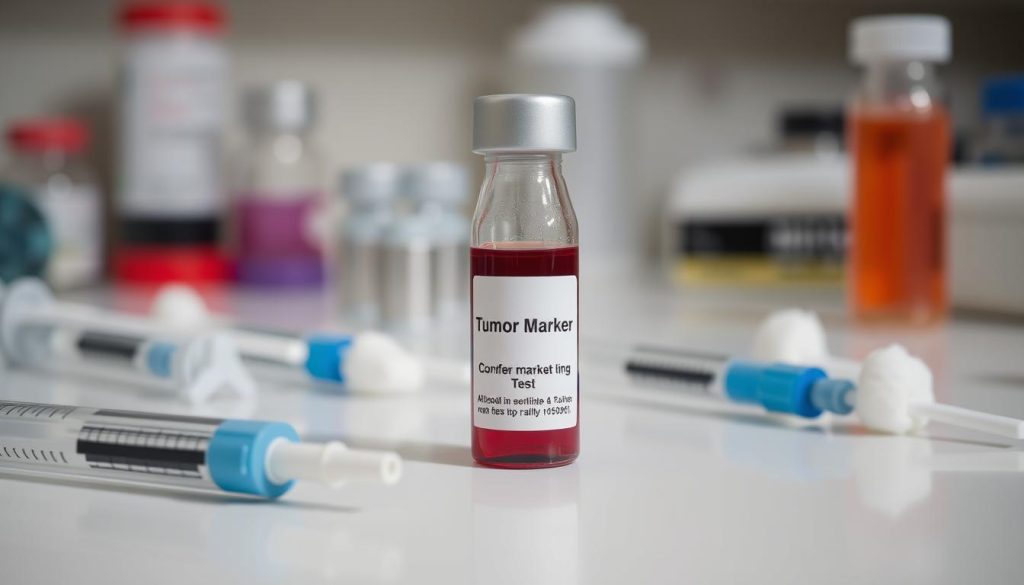
Using tumor markers makes cancer diagnosis and tracking more precise. It shows how far we’ve come in diagnosing and caring for patients with cancer.
The Emergence of Liquid Biopsy Blood Tests
The medical world is getting excited about the liquid biopsy blood test. It’s a new way to find cancer that’s less painful than old methods. Liquid biopsies are a big step forward in how we check for cancer.
Comparing Liquid Biopsy to Traditional Methods
Old biopsy methods need to take tissue out of you, often through surgery. This can hurt and might get infected. It’s also hard if tumors are hard to get to.
But, the liquid biopsy blood test is just a simple blood draw. It’s much easier and safer for you.
These blood tests let doctors keep an eye on cancer changes without more surgery. Liquid biopsies find cancer cells or DNA in your blood. This gives doctors a clear view of the cancer and how it’s reacting to treatment.
Future of Liquid Biopsy in Routine Cancer Detection
The future of liquid biopsy blood tests looks bright. They will soon be key in cancer care plans. They might find cancer sooner and help pick the right treatments.
As they get better, they’ll play a big role in managing cancer. This means better care for you and less pain.
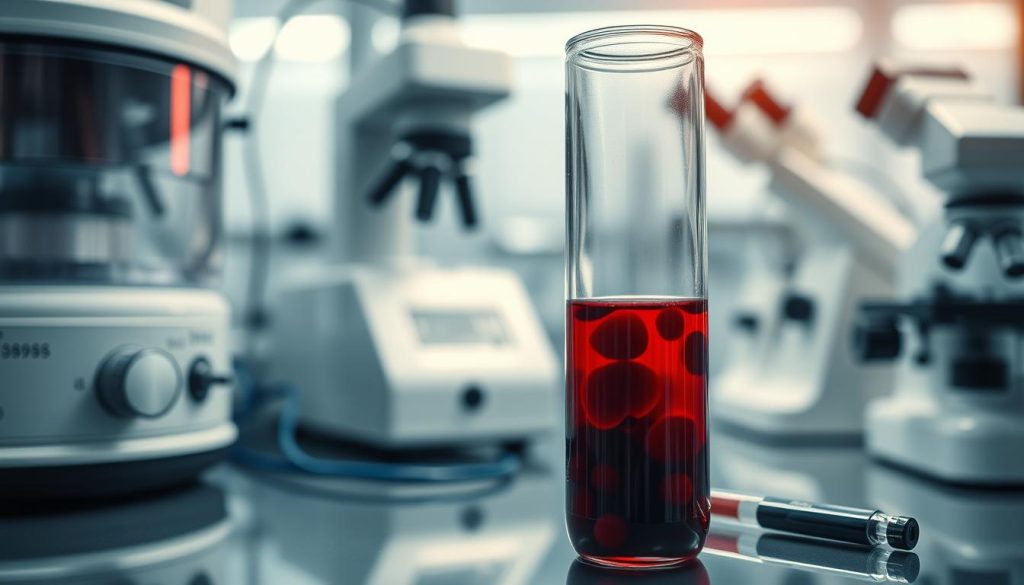
Adding liquid biopsy blood tests to regular care will make cancer diagnosis more accurate. It will also make things easier for you. You’ll need fewer painful biopsies and treatment plans will be quicker.
A Closer Look: Cancer Blood Test Accuracy
The medical world is working hard to make cancer blood test accuracy better. They focus on sensitivity and specificity to see how well these tests work. These factors help find cancer early and accurately, making the early detection blood test very important.
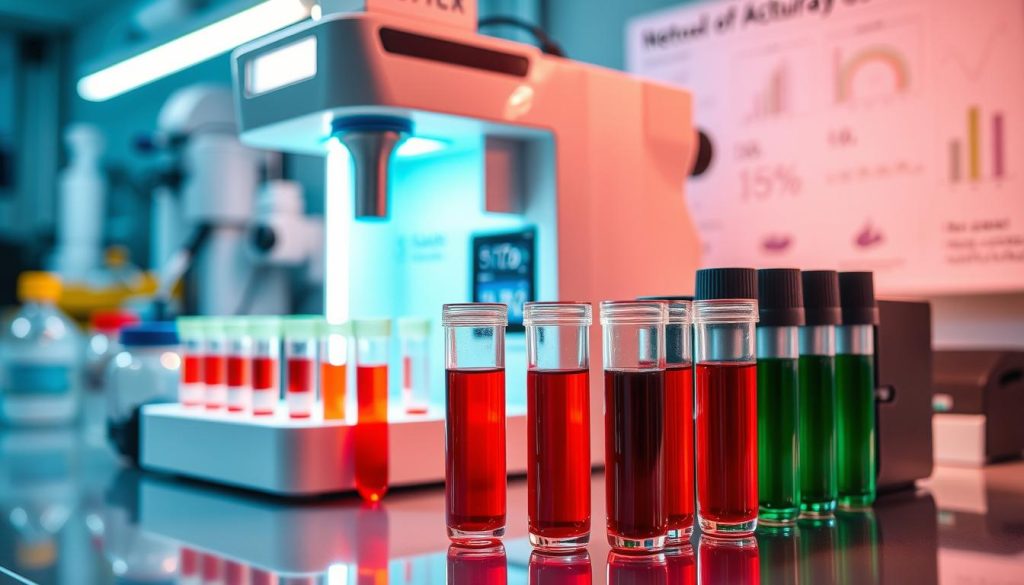
When it comes to cancer blood tests, accuracy means spotting cancer cells or markers in the blood right. A high accuracy rate means fewer false alarms, which can cause worry or delay treatment. But, no test is perfect yet. So, we need to keep improving them.
Improving cancer blood test accuracy involves new tech and understanding cancer better. As we learn more, we can make early detection blood tests more precise. This mix of tech and science could change how we find and treat cancers, helping patients a lot.
- Sensitivity of the tests determines their ability to detect cancer markers even at low levels.
- Specificity measures the test’s ability to only identify cancer markers, reducing false alarms.
Every step forward in these areas makes cancer blood test accuracy better. This brings us closer to reliable early detection blood tests. So, it’s key to keep funding research to make these tests real and save lives.
Blood Test for Cancer Types
Choosing the right blood test for cancer depends on knowing the different tests and what they can find. This helps doctors pick the best test for each person’s health and risk of cancer.
Understanding the Different Blood Tests Available
There are many blood tests for cancer that are important for finding cancer. Complete Blood Counts (CBC) check for blood cancers by looking at blood cell levels. Tumor marker tests look for substances made by cancer cells, like PSA for prostate cancer.
Circulating tumor DNA tests find genetic material from tumors in the blood. This gives clues about cancer’s presence and type.
Choosing the Right Blood Test for Specific Cancer Types
Which blood test for cancer types to use depends on the suspected cancer and the patient’s history. For example, a PSA test is often used for prostate cancer risk. A CBC might check for leukemia or lymphoma.
It’s important to know these differences for good screening and early detection.
To learn more about using blood tests for cancer, check out the Mayo Clinic’s insights. They explain how blood tests help diagnose cancer.
| Cancer Type | Recommended Blood Test | Key Markers or Components Analysed |
|---|---|---|
| Prostate Cancer | PSA Test | Prostate-specific antigen levels |
| Leukemia | Complete Blood Count (CBC) | White blood cells, Red blood cells, Platelets |
| Lung Cancer | Circulating Tumor DNA Test | Genetic markers from tumor DNA |
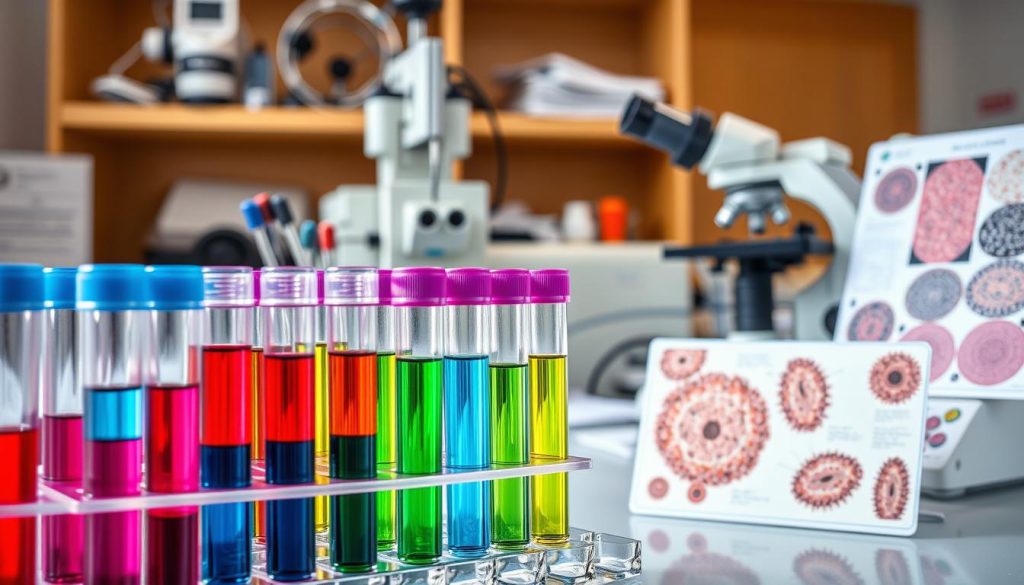
How Early Detection Blood Tests Work: A Simple Explanation
The importance of early detection blood tests and cancer screening blood tests in fighting cancer is huge. These tests find cancer early, often before symptoms show. Finding cancer early can lead to better treatment options.
Early detection blood tests look for special proteins linked to cancer. These proteins show up before symptoms do. This makes cancer screening blood tests key in keeping people healthy.
These tests give patients and doctors a big advantage in fighting cancer.
Here’s how a typical early detection blood test works:
- Sample Collection: A small blood sample is taken from the patient.
- Marker Identification: The sample is checked in a lab for cancer biomarkers.
- Data Analysis: The lab looks at the biomarkers. If they’re high, more tests might be needed.
- Follow-Up: Based on the results, more tests like imaging or biopsies might be suggested.
These tests are crucial in cancer treatment. They give a chance to act early, before cancer grows.
| Marker | Common Cancer Association | Detection Rate |
|---|---|---|
| CA-125 | Ovarian Cancer | High |
| PSA | Prostate Cancer | Medium to High |
| CEA | Colon Cancer | Medium |
This table shows how well different markers find cancer early. It shows the focused nature of these tests.
Early detection blood tests and cancer screening blood tests are a big step forward in health care. They give vital information that could save lives.
Advancements in Blood Test for Cancer Biomarkers
The world of cancer detection is changing fast, thanks to new blood test for cancer biomarkers. These updates help doctors predict cancer more accurately. They also lead to treatments that fit each patient’s needs, making the whole process better.
The Expanding List of Cancer Biomarkers
Recently, scientists have found many new biomarkers. These markers help doctors find cancer and know how aggressive it is. With more biomarkers, tumor marker blood tests can spot cancer sooner and more precisely.
How New Biomarkers Improve Early Detection
Discovering new biomarkers makes blood tests for cancer biomarkers better. These tests can find cancer before symptoms show up. This early detection can greatly improve treatment results and survival chances.
| Biomarker | Cancer Type | Impact on Detection |
|---|---|---|
| CA-125 | Ovary | Improves early detection, useful in tracking treatment response |
| PSA | Prostate | Screening for early-stage prostate cancer, monitor treatment efficacy |
| CEA | Colorectal | Indicator for presence of cancer and recurrences |
Blood Test for Cancer
A cancer screening blood test plays a key role in finding cancer early. Thanks to new medical tech, the blood test for cancer has changed how we fight cancer. It helps doctors and patients plan better treatment plans.
Cancer screening blood tests are a gentle way to check for cancer. This makes more people agree to get checked. Finding cancer early can greatly improve treatment success.
| Advantages | Impact |
|---|---|
| Non-invasive nature | Higher patient compliance and repeated screening |
| Early detection | Improved prognosis and patient outcomes |
| Cost-effective screening option | Accessible for a broader population |
Adding a blood test for cancer to regular health checks can save money. It helps avoid the high costs of treating cancer when it’s too late.
Using a cancer screening blood test gives doctors a strong tool. They can fight cancer by finding it early.
- Encourages population-wide cancer screening initiatives.
- Promotes the use of data-driven approaches to understand cancer metrics better.
- Enhances research opportunities by providing a wide array of data through non-invasive means.
Interpreting Your Blood Test Results: What Comes Next?
After a tumor marker blood test for cancer screening, the next steps are vital. Whether your results are positive, negative, or unclear, it’s crucial to understand them. This helps in planning the next steps wisely.
Positive Results and Follow-Up Procedures
Getting a positive result on a cancer blood test can be scary. But, it’s a sign to do more tests, not a final say. The cancer blood test accuracy can change, so more tests are needed to confirm cancer. Doctors usually suggest biopsies or imaging tests to find and confirm the tumor.
Navigating False Positives and False Negatives
False positives and negatives can be very upsetting. A false positive means a test says you have cancer when you don’t. This can cause a lot of stress and extra tests. On the other hand, a false negative means the test misses cancer when it’s there. This can delay treatment.
It’s important to follow up on initial test results. Healthcare providers might suggest more tests to make sure the diagnosis is right. These steps help make the diagnosis clearer and give patients peace of mind.
Doctors try to avoid these mistakes by using a tumor marker blood test with other tests. This improves the cancer blood test accuracy. It gives a better idea of a patient’s health status.
Addressing the Challenge of Overdiagnosis in Cancer Screening
The cancer screening blood test and early detection blood test are key in fighting cancer. They help find cancers early when they are easier to treat. But, there’s a big problem: overdiagnosis. This means finding cancers that won’t cause harm or symptoms in a person’s lifetime.
This issue worries us about the mental health effects, the need for treatments that might not be needed, and the cost to healthcare. Overdiagnosis can mean treating cancers that might not have hurt anyone if they were left alone.
To tackle overdiagnosis and overtreatment, we need to find a balance. We must use new blood tests to find cancers early but avoid adding to healthcare costs or stress. Here are some ways to do this:
- Use better ways to figure out who needs screening based on their risk.
- Teach patients more about the good and bad sides of cancer screening blood tests.
- Make the tests and technology better to cut down on false positives and improve accuracy.
| Screening Method | Benefits | Risks |
|---|---|---|
| Traditional Cancer Screening | Finds cancers early that can be treated | Can lead to finding cancers that don’t need treatment |
| Early Detection Blood Test | Finds markers of cancer without being invasive | May find cancers that are not dangerous, leading to unnecessary treatment |
| Genetic Screening | Finds cancer risks from genes | Raises ethical and privacy concerns, can cause worry |
To fight overdiagnosis, we need to keep improving cancer screening blood tests. We must learn to tell apart cancers that are deadly from those that are not. This way, we can make sure patients get the right care. It will make cancer screenings better and help patients avoid unnecessary worry and treatments.
The Patient’s Perspective: Preparing for a Cancer Screening Blood Test
Getting a cancer screening blood test is a big step in keeping healthy. It’s especially important for catching problems early. But, it’s not just about the medical side. You also need to think about how you feel and the practical stuff.
Psychological Considerations and Support
Thinking about the test can make you anxious or stressed. It’s important to get ready mentally and understand what might happen. Talking to friends, family, or a counselor can help a lot. Knowing what the test is about and what the results might be can also ease your worries. So, it’s good to talk to your doctor about any fears you have.
Logistical Aspects: Scheduling and Costs
Setting up a early detection blood test means thinking about your time and money. Try to pick a time when you can relax before and after. Also, knowing what your health insurance covers is crucial. Costs can change a lot based on your insurance and the tests you need.
- Contact your insurance provider to understand what costs are covered for a cancer screening blood test.
- Verify the need for referrals or pre-authorizations that might be necessary.
- Schedule the test during a period where you can have some tranquility before and after the procedure.
Comparing Blood Tests with Other Cancer Detection Methods
Modern medicine has many tools for finding cancer, each with its own strengths and weaknesses. Blood tests, like tumor marker tests, are key in catching cancer early. But they’re just one part of the puzzle. Other methods, like imaging tests and invasive procedures, also play a big role in finding cancer.
Knowing about each method helps patients and doctors make the best choice for each person. This choice depends on the person’s situation.
Imaging Tests vs. Blood Tests
Imaging tests, like CT scans and MRIs, show pictures of the body’s inside. They can find tumors. But blood tests look for molecular signals, sometimes before tumors are seen on images.
Imaging tests might cost more and use more radiation. But they give a clear view of tumors. Blood tests can’t do that on their own.
Invasive Procedures and Alternatives
Invasive procedures, like biopsies, remove tissue for lab tests. They’re the most accurate way to find cancer. But they can be risky, causing pain, infection, and other problems.
Blood tests, especially for tumor markers, are a safer way to check on cancer. They’re good for ongoing monitoring or as a first step. These methods work together to give patients a complete check-up.
FAQ
Q: What Are Cancer Screening Blood Tests?
A: Cancer screening blood tests look for cancer cells or markers in your blood. They help find cancer early. Early detection can lead to better treatment outcomes.
Q: Can Blood Tests Detect All Types of Cancer?
A: Yes, blood tests can find some cancers like leukemia and lymphoma. They can also find certain solid tumors like breast and prostate cancers. But, not all cancers can be found this way yet. Scientists are working to find more.
Q: How Accurate Are Cancer Blood Tests?
A: The accuracy of cancer blood tests depends on the test and the cancer type. They are tested for how well they work. While they are often very accurate, there can be false results. But, they are getting better with new research.
Q: What Are Tumor Markers?
A: Tumor markers are substances made by cancer cells or the body’s reaction to them. They help diagnose cancer, predict how it will progress, and check if treatment is working. They also help see if cancer comes back.
Q: What Is a Liquid Biopsy?
A: A liquid biopsy is a blood test that looks for cancer cells or DNA in your blood. It’s a new way to find cancer, check how well treatment is working, and find the right treatment for you.
Q: What Types of Cancer Biomarkers Are Currently Known?
A: There are many known biomarkers for different cancers. For example, PSA for prostate cancer and CA-125 for ovarian cancer. Researchers are always finding new ones to help detect cancer early and treat it better.
Q: What Should You Consider When Choosing a Blood Test for a Specific Cancer Type?
A: When picking a blood test, think about the cancer’s commonness, your risk, family history, and the biomarkers for that cancer. These factors help choose the right test for you.
Q: How Do Early Detection Blood Tests Work?
A: Early detection blood tests find biomarkers or genetic changes in your blood that show cancer. These signs are often there before symptoms appear. This allows for early treatment.
Q: What Comes Next After Receiving a Positive Result from a Cancer Screening Blood Test?
A: If a blood test shows cancer, more tests are needed to confirm it. This might include imaging tests or a biopsy. Your doctor will talk about what comes next and treatment options if cancer is found.
Q: How Are False Positives and False Negatives Addressed in Cancer Screening?
A: False positives and negatives are handled with more tests and checks. It’s also important to look at your health, family history, and other risk factors. More tests or different methods might be used to make sure you get the right diagnosis.
Q: What Are the Psychological and Logistical Considerations for a Cancer Screening Blood Test?
A: Thinking about the test can make you anxious. It’s good to talk to friends, family, or support groups. Also, plan the test, check insurance, and think about costs before you go.
Q: How Do Blood Tests for Cancer Compare with Imaging Tests and Invasive Procedures?
A: Blood tests are less invasive and quicker than imaging tests or biopsies. While imaging and biopsies give detailed tumor info, blood tests find molecular changes in cancer cells.












